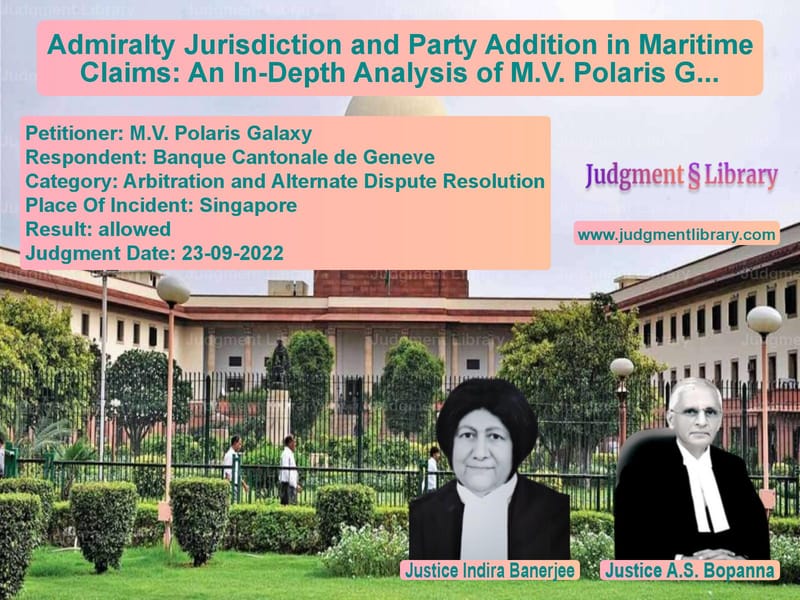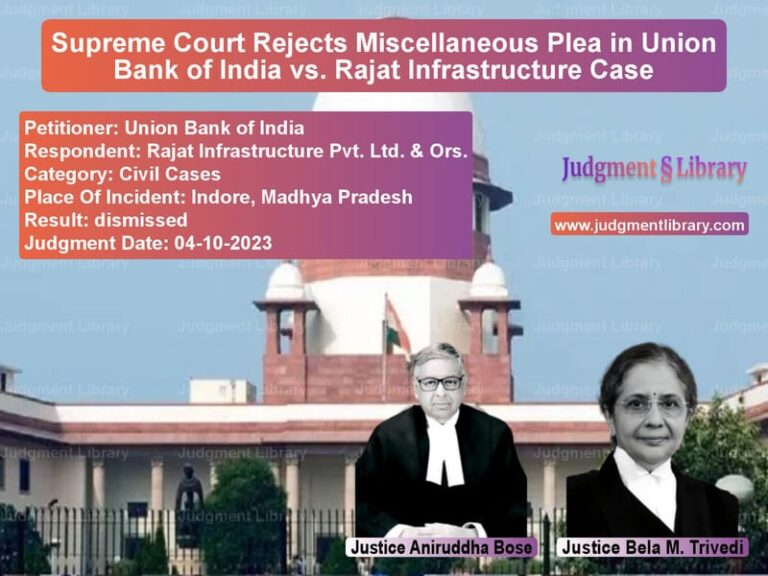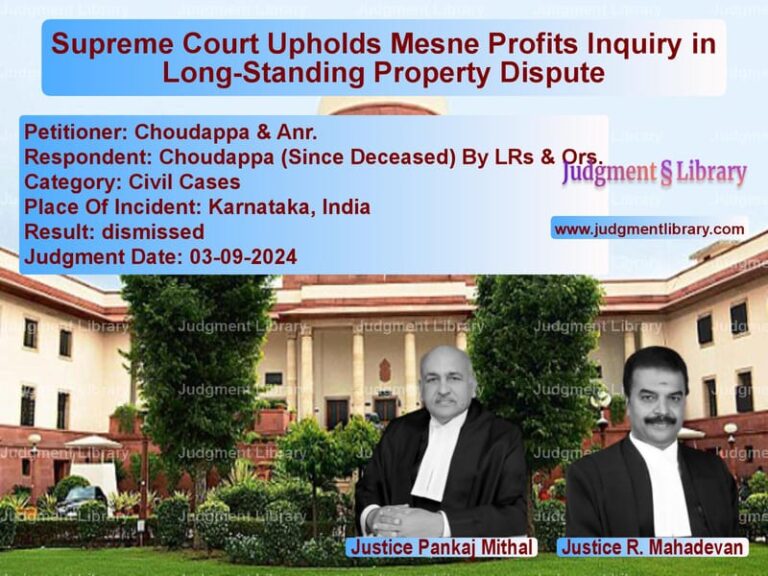Admiralty Jurisdiction and Party Addition in Maritime Claims: An In-Depth Analysis of M.V. Polaris Galaxy Case
The case of M.V. Polaris Galaxy involves a maritime dispute between the appellant, owners and parties interested in the vessel M.V. Polaris Galaxy, and the respondent, Banque Cantonale de Geneve. The appellant was involved in a contractual dispute concerning the delivery of marine fuel, which was supposed to be discharged at a port in Singapore. However, complications arose due to the non-delivery of goods as per the bill of lading, which led the respondent to initiate an admiralty suit seeking compensation for the misdelivery. The Supreme Court was approached after the Commercial Appellate Division of the Madras High Court allowed an appeal that had been filed by the respondent, effectively setting aside the order passed by the Commercial Division (Single Bench). This blog post analyzes the arguments presented by both parties, the reasoning of the Court, and the final judgment, which addressed key issues related to maritime law, the jurisdiction of the Admiralty Court, and the necessity of adding parties to the lawsuit.
Background of the Case
The case begins with a complex commercial arrangement where the respondent, Banque Cantonale de Geneve, financed the transaction for Gulf Petroleum FZC to purchase marine fuel oil from the Indian Oil Corporation (IOC). Gulf Petroleum then sub-chartered the M.V. Polaris Galaxy vessel to transport the fuel, which was supposed to be discharged at the Fujairah Port in the UAE. However, due to unforeseen circumstances, the discharge port was amended to Singapore. Following the delivery, the respondent bank claimed that the cargo was mis-delivered to a third party without the original bill of lading, which led to the institution of the admiralty suit.
Read also: https://judgmentlibrary.com/supreme-court-upholds-arbitration-award-in-seppco-vs-power-mech-dispute/
The Commercial Court, after hearing the case, allowed the respondent’s application to implead Gulf Petroleum FZC as a party in the suit, reasoning that Gulf Petroleum was a necessary party in the case. The respondent argued that Gulf Petroleum’s instructions led to the misdelivery of the cargo, and their presence was essential to properly adjudicate the issue. The appellant, on the other hand, contested the addition of Gulf Petroleum, arguing that they were not a proper or necessary party. The Single Bench of the Madras High Court agreed with the appellant and refused to add Gulf Petroleum to the suit. However, the Division Bench of the Madras High Court allowed the appeal, which led to the filing of a Special Leave Petition in the Supreme Court.
Petitioner’s Arguments
The appellant, representing the owners of the vessel M.V. Polaris Galaxy, argued several points in its defense:
- Jurisdiction and Legal Standing of Gulf Petroleum: The appellant contended that Gulf Petroleum, as the buyer of the fuel, had no direct involvement in the contractual obligations between the appellant and the respondent. They argued that Gulf Petroleum was not a necessary or proper party for the determination of the dispute under the bill of lading, which was the core issue in the admiralty suit.
- Non-joinder of Gulf Petroleum: The appellant emphasized that Gulf Petroleum was not a party to the contract of carriage or the bill of lading, and their role in the transaction was limited to being the buyer of the marine fuel. The appellant argued that Gulf Petroleum’s actions did not directly affect the respondent’s legal claim against the shipowner for the misdelivery of goods.
- Jurisdiction of the Commercial Division: The appellant raised concerns about the jurisdiction of the Commercial Appellate Division in hearing appeals related to party addition. The appellant argued that the Commercial Division had properly ruled on the addition of Gulf Petroleum, and the Division Bench had erred in its decision.
- Procedural Issues: The appellant argued that procedural fairness was compromised by the addition of Gulf Petroleum as a party to the suit. The appellant emphasized that such a significant addition of a party should not be allowed at such a late stage of the proceedings without proper justification.
Respondent’s Arguments
The respondent, Banque Cantonale de Geneve, made the following arguments in support of adding Gulf Petroleum as a party:
- Necessity of Gulf Petroleum in the Dispute: The respondent argued that Gulf Petroleum was directly involved in the misdelivery of the cargo and, as such, was a necessary party to the dispute. The respondent emphasized that Gulf Petroleum’s instructions were critical to the events leading to the misdelivery, and their absence from the proceedings would prevent a complete and fair adjudication of the matter.
- Legal Standing of the Respondent as the Owner of the Bill of Lading: The respondent pointed out that, as the lawful holder of the original bill of lading, they had the right to seek legal redress for the misdelivery of the cargo. The respondent argued that Gulf Petroleum’s role as the consignee of the cargo was not relevant to the issue of misdelivery, which was based on the failure of the shipowner to deliver the goods to the rightful holder of the bill of lading.
- International Trade and the Importance of Documentation: The respondent emphasized the importance of documentation in international trade, particularly the bill of lading, which serves as the document of title for the cargo. The respondent argued that the legal relationship between the appellant and the respondent was defined by the terms of the bill of lading, and any deviation from those terms constituted a breach of contract.
- Failure to Join Gulf Petroleum: The respondent further argued that Gulf Petroleum’s involvement in the dispute could not be ignored, as they had directly interacted with the appellant and issued instructions that led to the misdelivery. The respondent contended that, without Gulf Petroleum, the case could not be fully resolved, as their role was integral to the issue at hand.
The Court’s Reasoning
The Supreme Court, after carefully considering the arguments of both parties, delivered the following analysis:
- Importance of the Bill of Lading: The Court reaffirmed the importance of the bill of lading as the key document in the dispute. The Court emphasized that the bill of lading not only serves as evidence of the contract of carriage but also as a document of title to the goods. The Court held that the respondent, as the lawful holder of the original bill of lading, had the right to bring an action against the shipowner for misdelivery of goods.
- Necessity of Gulf Petroleum in the Suit: The Court agreed with the respondent’s argument that Gulf Petroleum was a necessary party to the suit. The Court found that Gulf Petroleum had issued instructions regarding the delivery of the cargo and that their actions had directly impacted the delivery of goods. The Court held that, in order to adjudicate the dispute fully, Gulf Petroleum’s presence was essential.
- Jurisdiction and the Role of the Commercial Division: The Court clarified the jurisdiction of the Commercial Division and the Commercial Appellate Division in maritime disputes. The Court ruled that the Commercial Division had correctly exercised its jurisdiction in deciding to add Gulf Petroleum as a party to the suit. The Court emphasized that the addition of Gulf Petroleum was necessary for the complete adjudication of the issues at hand.
- Dismissal of Procedural Objections: The Court dismissed the appellant’s procedural objections, noting that the addition of Gulf Petroleum as a party was consistent with the principles of justice and fairness. The Court held that the procedural fairness of the trial was not compromised by Gulf Petroleum’s inclusion in the suit.
- Harmonizing the Commercial Courts Act and Admiralty Act: The Court harmonized the provisions of the Commercial Courts Act and the Admiralty Act, emphasizing that the special provisions of the Admiralty Act govern maritime claims. The Court concluded that the appeal against the order of the Commercial Division was maintainable and that the Division Bench had correctly allowed the appeal.
The Court’s Decision
The Supreme Court ruled in favor of the respondent and made the following orders:
- Allowing the Appeal: The Court allowed the appeal, overturning the Single Bench’s order and affirming the Division Bench’s decision to add Gulf Petroleum as a party to the suit.
- Costs: The appellant was directed to pay the costs of the proceedings, which were assessed at Rs. 1,50,000, as ordered by the Division Bench.
- Further Proceedings: The Court directed the trial court to proceed with the suit, incorporating Gulf Petroleum as a party, and to resolve the issues expeditiously in accordance with the law.
Conclusion
This case highlights the complexities of maritime law, particularly in relation to the ownership and control over goods covered by a bill of lading. The Supreme Court’s decision underscores the importance of ensuring all necessary parties are included in a suit, especially when they are integral to the dispute. The judgment clarifies the procedural framework for adding parties in admiralty suits and emphasizes the significance of the bill of lading in determining the rights and liabilities of the parties involved in maritime transactions.
Petitioner Name: M.V. Polaris Galaxy.Respondent Name: Banque Cantonale de Geneve.Judgment By: Justice Indira Banerjee, Justice A.S. Bopanna.Place Of Incident: Singapore.Judgment Date: 23-09-2022.
Don’t miss out on the full details! Download the complete judgment in PDF format below and gain valuable insights instantly!
Download Judgment: m.v.-polaris-galaxy-vs-banque-cantonale-de-supreme-court-of-india-judgment-dated-23-09-2022.pdf
Directly Download Judgment: Directly download this Judgment
See all petitions in Arbitration Act
See all petitions in International Arbitration
See all petitions in Enforcement of Awards
See all petitions in Commercial Arbitration
See all petitions in Judgment by Indira Banerjee
See all petitions in Judgment by A. S. Bopanna
See all petitions in allowed
See all petitions in supreme court of India judgments September 2022
See all petitions in 2022 judgments
See all posts in Arbitration and Alternate Dispute Resolution Category
See all allowed petitions in Arbitration and Alternate Dispute Resolution Category
See all Dismissed petitions in Arbitration and Alternate Dispute Resolution Category
See all partially allowed petitions in Arbitration and Alternate Dispute Resolution Category







